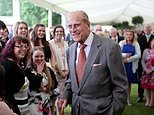Prince Philip was 34 when he first conceived the idea of a scheme to help bridge the gap between formal education and national service.
Inspired – or, as Philip put it, ‘pestered’ – by his headmaster at Gordonstoun school, Kurt Hahn, he worked to set up a challenge that allowed young men to make the best use of their free time and the Duke of Edinburgh ‘s award scheme (DofE) was born.
Now, 65 years on, more than 6.7million young men and women have participated in DofE programmes in the UK and achieved 3.1million awards. It is now offered in more than 140 countries. The scheme is arguably the duke’s greatest legacy, having helped young people learn new skills, confidence and resilience – improving their life chances and employability.
But it did not receive such a warm reception when he first mooted the idea, with the then minister of education Sir David Eccles commenting: ‘I hear you’re trying to invent something like the Hitler Youth.’
Nevertheless, the concept got off the ground in February 1956 and after the first year 7,000 boys had started a DofE programme and 1,000 awards had been achieved. By the second year, other small-scale pilots were launched overseas and a programme for girls had been set up.
Hahn, a German Jew who fled the Nazis, was a huge influence on Philip’s life. In 1934 he established Gordonstoun, the Scottish private school. Philip, who had moved to the UK from Germany, was one of his first pupils.
At Gordonstoun, the boys rose at 6.30am for a cold shower and a run. Hahn, who died in 1974, had been concerned with the ‘decline of modern youth’ and pinpointed antidotes, such as fitness training, expeditions and projects. His motto was ‘There is more in you than you think’ and it was a philosophy that would leave a lasting impression on the young prince – and one that still resonates with the awards today.
It takes six months each to complete the bronze and silver awards, and 12 months for the gold. It is open to everyone aged 14 to 24. Nowadays, there are four main sections of a DofE programme – volunteering, physical, skills and expedition. For gold, participants also complete a residential section.
The awards have moved with the times and include activities such as vlogging, kite-surfing and DJing alongside traditional pursuits such as bell-ringing and cross stitch.
Awards are achieved through schools, colleges, universities, youth clubs, businesses, housing associations and even in young offender institutions. Heathrow and British Gas are among the companies which deliver the scheme to their young employees.
Research has found those who complete an award are more likely to be retained by the organisation and promoted.
The intake of 2019/20 saw record-breaking numbers of young people start the DofE scheme, with 295,490 entering the programme, up 2.6 per cent. Of those, 72,577 came from disadvantaged backgrounds. A record 159,051 awards were presented.
Among those to achieve the award in previous years is the Duchess of Cambridge, who won her gold while at Marlborough College. Dame Kelly Holmes got a silver award, while footballer Kevin Keegan and Olympian Tessa Sanderson achieved bronze. Other notable alumni include singer Katherine Jenkins, actress Ashley Jensen and adventurer Ben Fogle.
Anyone who achieves a gold award is invited to a presentation attended by a member of the Royal Family. The duke himself attended more than 500 ceremonies. Prince Philip’s youngest son, Edward, Earl of Wessex, has taken over as patron.
